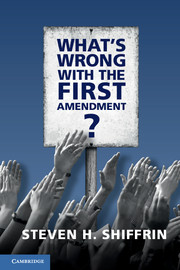3 - Race
from PART I
Published online by Cambridge University Press: 05 September 2016
Summary
The election of Barack Obama to the presidency was a milestone in American history that many of us thought we would never see. But, an end to racism it did not mark. The facts on the ground remain disturbing. Three times as many black children live in poverty as opposed to white children. Black unemployment rates are substantially higher than those of whites. Black men are more than six times as likely as white men to be imprisoned. Efforts to exclude blacks from the polls have been upheld by the Supreme Court on specious grounds. Facts such as these are not uniformly appreciated. Although racial attitudes have improved over time, any claim that we have moved to a post racial environment is exaggerated. Indeed, after reviewing substantial data and the evidence of racial polarization, David McAdam and Karina Kloos conclude: “Far from the imagined post-racial society Obama's election was supposed to herald, we find ourselves living through the period of greatest racial tensions and conflict since the 1960's and early 1970's.”
Nonetheless, publicly blatant racist speech has long been socially unacceptable. Unacceptable, as it may be, it is constitutionally protected. That protection has long been identified as a constitutional marker separating the United States from other civilized countries. Many Americans are proud that our Constitution protects not just “free thought for those who agree with us but freedom for the thought that we hate.” On the other hand, some speech we hate can cause significant harm and does not deserve to be protected. The legal toleration of racist speech is incompatible with the nation's commitment to equal citizenship. It tolerates the denigration of vulnerable citizens on the basis of their skin color or ethnic background, factors that should be irrelevant to their relationship to the state or society. This toleration is inconsistent with the kind of public culture a just society needs to foster. To be sure, I can see the attraction of a free-wheeling society where anyone can say anything, of maintaining a tolerant posture, and some find attraction in the stereotypically masculine emotionless posture that irrational words cannot hurt me.
- Type
- Chapter
- Information
- What's Wrong with the First Amendment , pp. 35 - 46Publisher: Cambridge University PressPrint publication year: 2016

